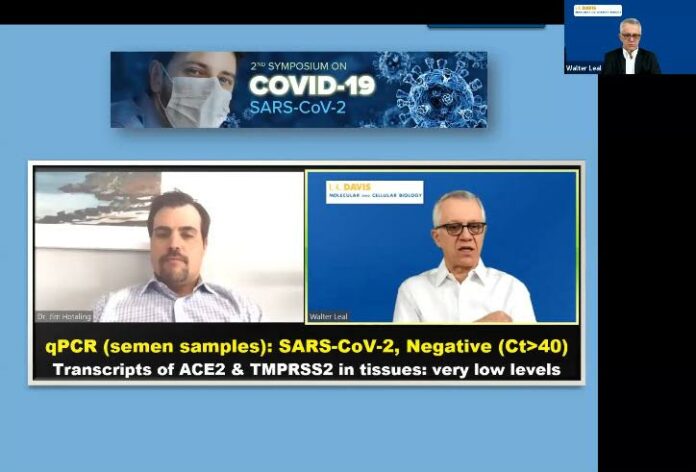Researchers, medical professionals across UC system share recent work, answer questions regarding novel coronavirus
On April 14, UC Davis held its second virtual COVID-19 symposium to update the public about recent research being conducted across the UC campuses as well as to answer questions from viewers. Walter Leal, a distinguished professor in the Department of Molecular and Cellular Biology, moderated the event again after organizing the first symposium.
Due to his involvement in research during the Zika virus pandemic, Leal received many questions when the current pandemic began. Fueled by a love for learning and former experience with hosting large events, Leal decided to gather people who could answer these questions.
“There are many unknowns about this new virus and how it is transmitted and prevented, etc,” said You-Lo Hsieh, a distinguished professor and chair of the Department of Textiles and Clothing, via email. “As new scientific data and analyses become available, symposiums like these organized by UC Davis are effective in relating the most current knowledge to the public.”
The symposium involved medical professionals such as Allison Brashear, the dean of the UC Davis School of Medicine; David Lubarsky, the vice chancellor of human health and chief executive officer for UC Davis Health; Emanual Mverakis, an associate professor in the Department of Dermatology at UC Davis Health; William Isenberg, the chief quality and safety officer for Sutter Health and Anoop Maheshwari, a doctor at Riverside Community Hospital. The full three-hour symposium can be streamed on the “’Biochemistry Channel” on Youtube.
The event opened with a statement by Chancellor Gary May who introduced UC President Janet Napolitano. In her welcoming address, Napolitano thanked faculty across the UC system for their efforts in researching COVID-19, highlighting undocumented students and faculty who are also contributing to these studies.
Among the panelists was Atul Malhotra, a professor of health from UC San Diego Health, who discussed the effects of COVID-19 on the respiratory system and its shared similarities with acute respiratory distress syndrome (ARDS). Malhotra warned that mechanical ventilators can be life-saving if set up correctly but deadly if not placed at the right settings.
Malhorta studies the antibody tocilizumab’s response to COVID-19-induced pneumonia. While the antibody has shown significant improvement in patients in terms of body temperature, oxygen saturation and oxygen inhalation, further tests and more data are necessary to confirm its effectiveness.
“These symposia provide an excellent vehicle to disseminate knowledge,” Malhotra said via email. “The information we receive through mass media often has some spin or interpretation based on political or other pressures. Having a frank discussion with questions and answers is a good way to keep people informed.”
In the closing statements of his presentation, Malhotra spoke about the importance of randomized treatments and studies, as opposed to applying various medicines in hopes that one will act as a cure. In doing so, people are depleting supplies for patients who actually need specific medications for their health conditions.
“Many people on TV recommend just trying various medicines in a haphazard way without any evidence,” Malhotra said. “The use of medications this way makes it very hard for us to tell the truth. Also medications have costs and side effects so the use of medicines without evidence has important risk as well as possible benefits.”
In addition to a discussion on clinical trials and prevention methods for humans, the concern of contracting COVID-19 from pets was addressed by Jane Sykes, a professor in the Department of Medicine and Epidemiology at the UC Davis School of Veterinary Medicine.
“The most important thing is that even though cats, and to a lesser extent, dogs, can be infected through contact with infected people, pets are not the drivers of transmission of SARS-CoV2 – human to human transmission is,” Sykes said via email. “People should continue to enjoy the benefits of the human animal bond, especially at such a stressful time. It remains possible that we will see evidence of pet to human transmission, but people are much, much more likely to get infected by going to the grocery store or a restaurant. The finding of animal infections needs to take into account the ‘big picture.’”
After the panelists gave brief presentations, Leal introduced Maheshwari to share his testimony of being diagnosed with and recovering from COVID-19. Maheshwari explained that he had contracted the virus from a patient despite wearing the necessary personal protective equipment. He described the worsening of his condition and the emotional toll he experienced when it had seemed his chances of survival were slim.
Maheshwari advised people to visit the hospital if they recognize any symptoms rather than thinking they can recover on their own.
Leal then relayed questions asked by viewers to each of the researchers, addressing topics such as reinfection and the use of antibiotic tests. One topic that was frequently asked about was the utilization of homemade masks and their effectiveness.
“Wearing masks can reduce the spread of COVID-19 by reducing the largest droplets from sneeze and cough,” Hsieh said. “However, smaller droplets or aerosol from speaking or breathing can travel far for minutes and are too small to be blocked by homemade masks. Keeping distance is still critical.”
Leal concluded the event by thanking all of the panelists for their time and thanking health care workers for their continued work fighting COVID-19. Leal added that this symposium also took the efforts of information technology experts and communication specialists, as well as his family members, to make the event run smoothly.
“From what I heard from attendees, they say it was helpful,” Leal said. “If so, mission accomplished.”
Written by: Michelle Wong — science@theaggie.org









